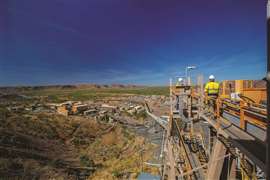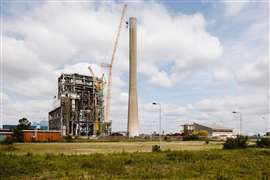Online exclusive: Rokbak investigates electric and hydrogen-powered articulated trucks
25 April 2023
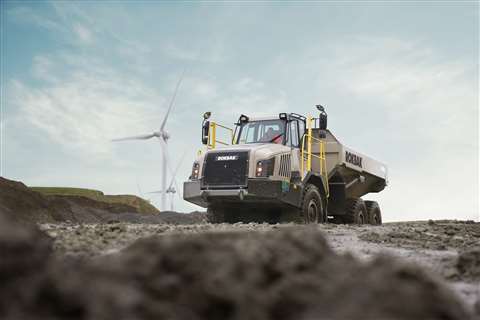 Hauler sales have been strong worldwide over the last 18 months
Hauler sales have been strong worldwide over the last 18 months
The idea of articulated trucks that can carry a payload of 30 tonnes being powered by electric power might seem far fetched but it is a possibility that the company Rokbak is looking into. Paul Douglas, Managing Director of the articulated truck company – which is part of the Volvo group – says that they are investigating all possibilities.
“Our trucks will have to be zero emissions somehow. The question is: what does that look like?” comments Douglas. “Electrification using battery technology that you can see today is a stretch for these big products because these are big power demand for long hours of usage.”
As Douglas says, electric power probably isn’t the best source for trucks due to how large they are and their work cycles – it isn’t uncommon for trucks to be run for 20 or 22 hours a day. “We are looking at hydrogen internal combustion engine and fuel cells to provide the electricity using hydrogen. These are technologies that Volvo is working with on their own highway truck and bus solutions.”
Douglas is originally an engineer and the challenges of cutting emissions and alternative power sources clearly excites him. He makes the point that, with technology developing at a rapid rate, no one in the construction industry can confidently state what the future will hold for power.
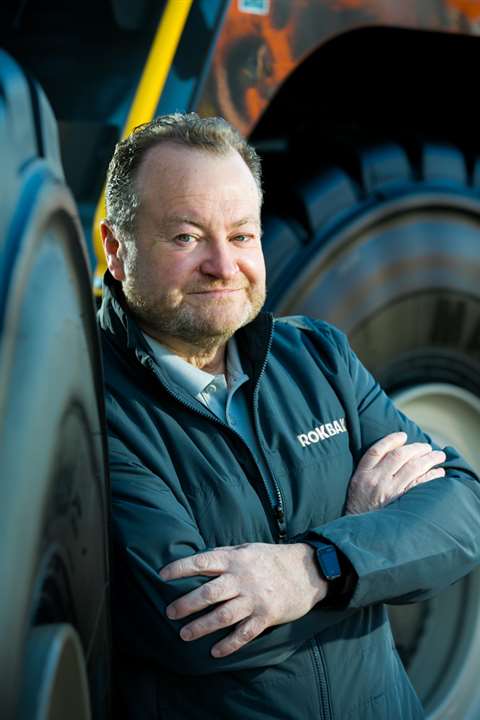 Paul Douglas, Managing Director of Rokbak. Image copyright of Ian Macaulay
Paul Douglas, Managing Director of Rokbak. Image copyright of Ian Macaulay
“It is easier to electrify the smaller stuff,” he says. “But there’s a lot of learning that comes from that. And you know, I can’t keep up with battery technology. It’s moving so quickly. Every six months battery capabilities seem to grow almost exponentially. I don’t know where it will all end up, but I think it’ll be a combination; some products will be batteries, some will be hydrogen fuel cells, and some will be hydrogen internal combustion.”
Strong sales for haulers
The last 18 months have been a boom time for both rigid and articulated haulers with numbers the highest they have been for around a decade at around 9,000 units a year. Part of this is due to pent up demand that followed the Covid-19 pandemic added to governments around the world investing in large infrastructure projects although Douglas believes that this is likely the peak of the market.
“We all felt at 8,000 units worldwide, that would be the peak. Then we said the same thing at 8,500, but now we are over 9,000 units. When I look around specific markets, we can see the slowdown coming, such as in Europe. I think we’re probably at the peak now. How long will that hold? Most of 2023 will probably level out [at current levels] although we could start to see a downturn in the second half of the year. It’s very strong at the moment, so we need to capitalise on that as much as we can.”
One of the markets that has driven this growth is North America, which Douglas says accounts for over half of Rokbak’s sales. In terms of smaller markets that have seen good growth he highlights Indonesia and the UK where the HS2 high-speed train project has played a key role in generating demand.
The brand of Rokbak has been around now for around 18 months following the name change from Terex Trucks. Douglas says that a huge effort went into this and that the response from the industry has been very positive. “The reception of it has been fantastic, first and foremost with our own dealer network because we were asking them to move from the old name to Rokbak. But they’ve gone with it, they’ve got a positive feel about it, they’ve invested into. The attraction that we’re getting from people that want to be on this journey with this, inquiries about becoming our dealer, has been really good.”
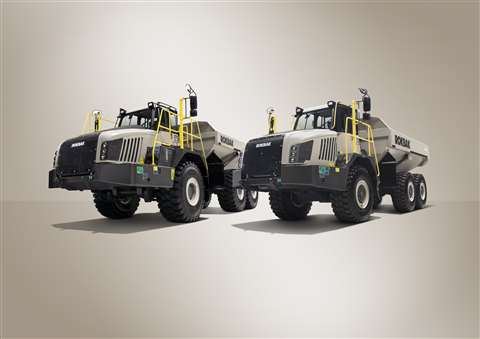 The way that haulers are powered will change in the future
The way that haulers are powered will change in the future
How will alternative power change construction?
Talking about the dealer network, the change that we spoke about at the start of this article, from diesel powered trucks to alternative powered trucks, will impact dealers in more ways than one. First, they will be selling a different product and secondly there are different demands and opportunities with this.
“Your dealer partners, the people that sell and support the product – this is going to be a new adventure for them as well,” he says. “It’s new technology for them. An electric drive product probably gets less wear parts, less servicing and spares opportunity. That’s going be a real challenge for the traditional dealer. Their business model’s going to have to evolve.”
Equipment manufacturers have reduced emissions to meet different standards around the world and are now investing heavily into the R&D of alternative power sources, all while juggling issues such as rising inflation and a lack of skilled workers. It is a challenge, but Douglas gives off the sense that he wouldn’t have it any other way.
“Moving into this new technology, new manufacturing processes are going to be required, new dealer models. There’s a real change, you can feel it in the air,” he says, pausing for breath before adding with a smile, “It’s fascinating.”
STAY CONNECTED


Receive the information you need when you need it through our world-leading magazines, newsletters and daily briefings.
CONNECT WITH THE TEAM









